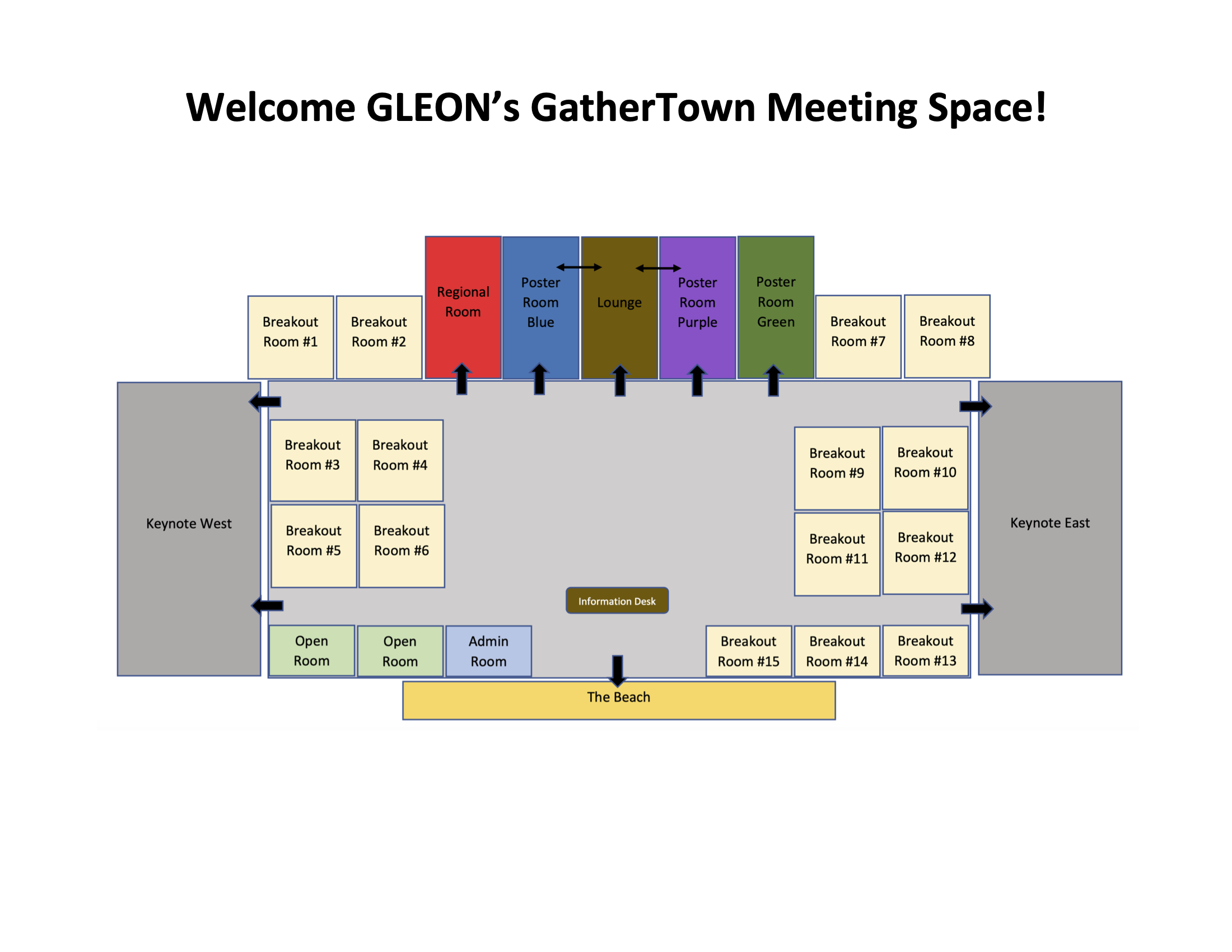

The GLEON 2023 Virtual All Hands’ Meeting, 13-17 February 2023 was held in the GatherTown online meeting space following a similar program and weekly schedule for online meeting activities as before (see below for a Program Overview).
With the success of the GLEON 2021 Virtual Meeting and return to an in-person format at the GLEON 2022 Meeting at Lake George, New York, the Steering Committee recognized the value of both meeting formats to facilitate the inclusiveness of online meetings and the kinds of interactions at in-person meetings that are key to the network’s collaborative approach to lake science. They made a commitment to organize All Hands’ Meetings in both online and in-person formats in 2023.
The hashtag #GLEON2023Virtual will be used for social media.
Registered meeting participants will receive an email a week before the meeting with connection instructions for the GatherTown meeting platform, a detailed program, and other meeting information. Here is a preliminary schedule of live sessions to help with planning your schedule for the week:
The GLEON Student Association (GSA) workshop subcommittee organized pre-recorded workshops for asynchronous viewing. The online videos were uploaded in shorter modules and available several weeks before the GLEON 2023 Virtual Meeting and then published to the GLEON YouTube channel.
The topics will be the same as the workshops at the in-person GLEON 2022 Meeting at Lake George, NY:
Three simple guidelines for science communication by Ben Kraemer – Our careers and our science depend on our ability to communicate effectively. Communicating effectively helps others to learn from our science, recognize its message, and integrate that message into our collective scientific understanding. However, many scientists are under-trained in how to communicate their science effectively. This workshop will present three simple guidelines that can help us get funding, write well-structured manuscripts, and design effective posters and oral presentations. The workshop will also include “hands-on” activities using examples of your own writing and examples from published literature.
Introduction to real-time lake forecasting: learn, teach, and generate forecasts with Macrosystems EDDIE modules and the NEON Forecasting Challenge by Mary Lofton, Freya Olsson, and Cayelan Carey – The use of near-term, iterative forecasting – i.e., making forecasts of future ecosystem conditions with uncertainty that are constantly being updated as new data become available – is rapidly increasing within the lake research community. However, many scientists may not be familiar with forecasting methods, educational materials, or know how to develop their own forecasts. This workshop will tackle this gap! First, we will provide participants with all materials needed to learn and teach the basics of ecological forecasting with four stand-alone, modular activities that use National Ecological Observatory Network (NEON) lake data and are delivered through R Shiny apps. Our educational modules are part of the Macrosystems EDDIE (Environmental Data-Driven Inquiry & Education) program, and each module comprises three ~1 hr activities which may be completed all at once or individually. We will provide an overview of the modules and helpful tips for teaching them in your classroom. Second, we will introduce you to the NEON Forecasting Challenge for lakes, a national-scale effort of generating real-time forecasts for lakes across the U.S. We will provide you with all of the information and materials so that you can start submitting to the Challenge when it opens in Winter 2023. Come join our effort!
GLEON-NEON Partnership by Kaelin Cawley – This workshop will serve as an introduction to the US National Ecological Observatory Network (NEON) and the data it generates and serves to the scientific community. The session will provide a background on the US NEON program, the types of data that are collected in terrestrial, stream, and lake sites, and tools available to access the data. Workshop participants will get a chance to work with GLEON and NEON scientists to dive into the data, make discoveries to understand complex limnological phenomena, and report back to others on what they found.
How to build a model in R by Robert Ladwig, Hilary Dugan, and Paul Hanson – Want to be a modeler but don’t know where to start? Do you find the word “model” scary? Wish you knew more about how to get started building models in R? If yes to any of the above, this workshop is for you. If you already have some R basics under your belt, we aim to add modeling to your R skillset. Learn what models are and how models are built, calibrated, and used for simplifying data and prediction.
A workshop Q&A session is tentatively scheduled during the virtual meeting live sessions. If you have any questions about workshops, please contact the GSA.
GLEON used a variety of technologies during the G2023 Virtual Meeting, including GatherTown (for the main meeting platform), Slack (for interactive dialogue), and Zoom (for plenary sessions accessed via GatherTown or Zoom directly).
The GSA communications subcommittee set-up a Technical Support (#technical-support) channel in the GLEON Slack workspace to provide information and help answer questions about virtual meeting technologies. They have also prepared an article and “how to” video about using Slack.